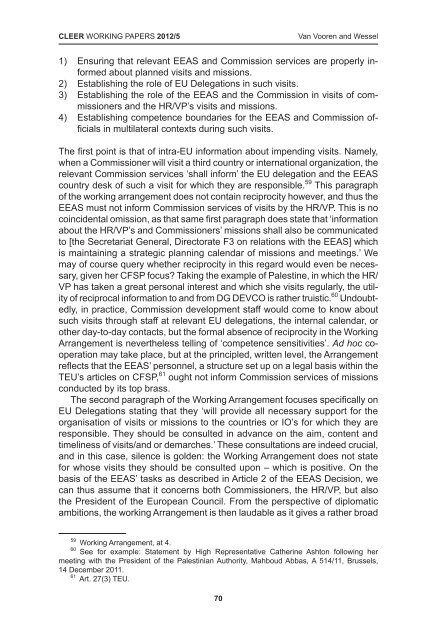Principles and practices of EU external representation - TMC Asser ...
Principles and practices of EU external representation - TMC Asser ...
Principles and practices of EU external representation - TMC Asser ...
Create successful ePaper yourself
Turn your PDF publications into a flip-book with our unique Google optimized e-Paper software.
CLEER WORKING PAPERS 2012/5<br />
Van Vooren <strong>and</strong> Wessel<br />
1) Ensuring that relevant EEAS <strong>and</strong> Commission services are properly informed<br />
about planned visits <strong>and</strong> missions.<br />
2) Establishing the role <strong>of</strong> <strong>EU</strong> Delegations in such visits.<br />
3) Establishing the role <strong>of</strong> the EEAS <strong>and</strong> the Commission in visits <strong>of</strong> commissioners<br />
<strong>and</strong> the HR/VP’s visits <strong>and</strong> missions.<br />
4) Establishing competence boundaries for the EEAS <strong>and</strong> Commission <strong>of</strong>ficials<br />
in multilateral contexts during such visits.<br />
The first point is that <strong>of</strong> intra-<strong>EU</strong> information about impending visits. Namely,<br />
when a Commissioner will visit a third country or international organization, the<br />
relevant Commission services ‘shall inform’ the <strong>EU</strong> delegation <strong>and</strong> the EEAS<br />
country desk <strong>of</strong> such a visit for which they are responsible. 59 This paragraph<br />
<strong>of</strong> the working arrangement does not contain reciprocity however, <strong>and</strong> thus the<br />
EEAS must not inform Commission services <strong>of</strong> visits by the HR/VP. This is no<br />
coincidental omission, as that same first paragraph does state that ‘information<br />
about the HR/VP’s <strong>and</strong> Commissioners’ missions shall also be communicated<br />
to [the Secretariat General, Directorate F3 on relations with the EEAS] which<br />
is maintaining a strategic planning calendar <strong>of</strong> missions <strong>and</strong> meetings.’ We<br />
may <strong>of</strong> course query whether reciprocity in this regard would even be necessary,<br />
given her CFSP focus? Taking the example <strong>of</strong> Palestine, in which the HR/<br />
VP has taken a great personal interest <strong>and</strong> which she visits regularly, the utility<br />
<strong>of</strong> reciprocal information to <strong>and</strong> from DG DEVCO is rather truistic. 60 Undoubtedly,<br />
in practice, Commission development staff would come to know about<br />
such visits through staff at relevant <strong>EU</strong> delegations, the internal calendar, or<br />
other day-to-day contacts, but the formal absence <strong>of</strong> reciprocity in the Working<br />
Arrangement is nevertheless telling <strong>of</strong> ‘competence sensitivities’. Ad hoc cooperation<br />
may take place, but at the principled, written level, the Arrangement<br />
reflects that the EEAS’ personnel, a structure set up on a legal basis within the<br />
T<strong>EU</strong>’s articles on CFSP, 61 ought not inform Commission services <strong>of</strong> missions<br />
conducted by its top brass.<br />
The second paragraph <strong>of</strong> the Working Arrangement focuses specifically on<br />
<strong>EU</strong> Delegations stating that they ‘will provide all necessary support for the<br />
organisation <strong>of</strong> visits or missions to the countries or IO’s for which they are<br />
responsible. They should be consulted in advance on the aim, content <strong>and</strong><br />
timeliness <strong>of</strong> visits/<strong>and</strong> or demarches.’ These consultations are indeed crucial,<br />
<strong>and</strong> in this case, silence is golden: the Working Arrangement does not state<br />
for whose visits they should be consulted upon – which is positive. On the<br />
basis <strong>of</strong> the EEAS’ tasks as described in Article 2 <strong>of</strong> the EEAS Decision, we<br />
can thus assume that it concerns both Commissioners, the HR/VP, but also<br />
the President <strong>of</strong> the European Council. From the perspective <strong>of</strong> diplomatic<br />
ambitions, the working Arrangement is then laudable as it gives a rather broad<br />
59 Working Arrangement, at 4.<br />
60 See for example: Statement by High Representative Catherine Ashton following her<br />
meeting with the President <strong>of</strong> the Palestinian Authority, Mahboud Abbas, A 514/11, Brussels,<br />
14 December 2011.<br />
61 Art. 27(3) T<strong>EU</strong>.<br />
70

















